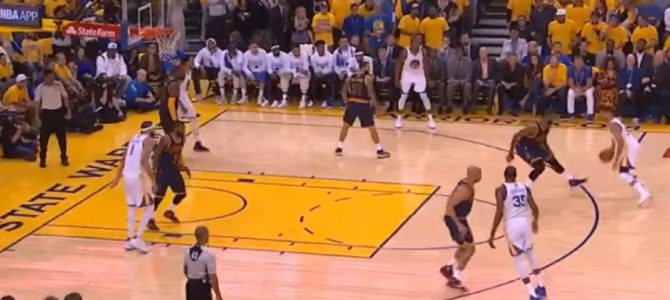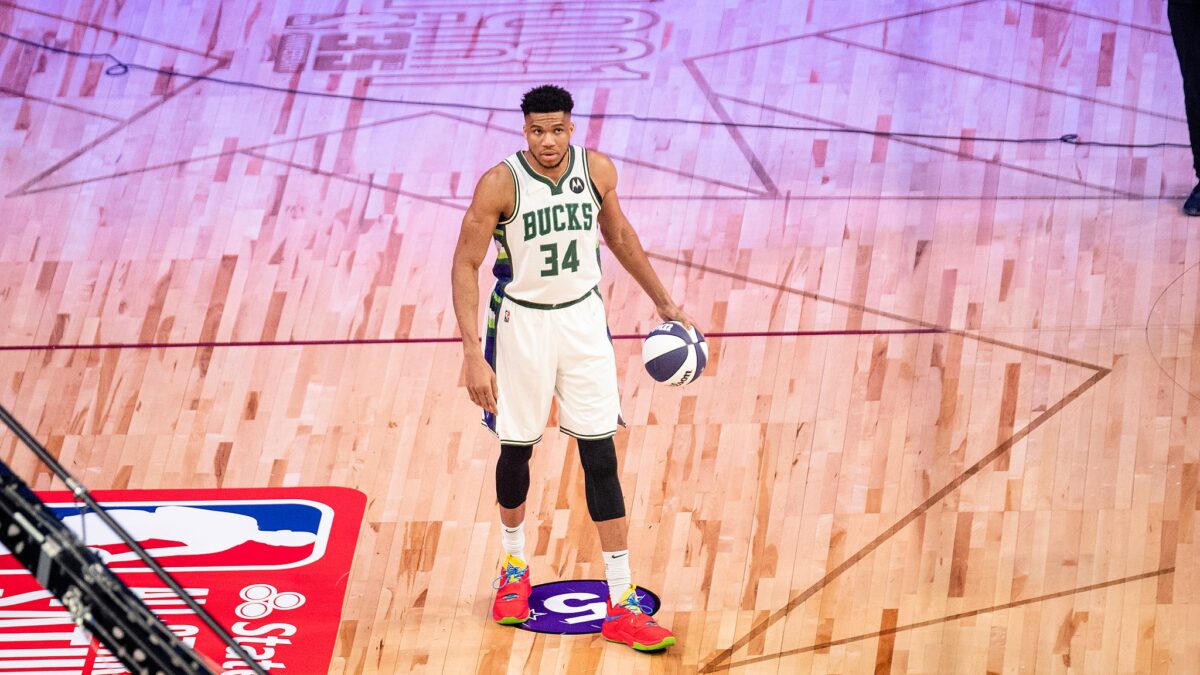
Ben Franklin definitely did not envision basketball playoffs when inventing his famous proverb about fish and guests, but his axiom applied to this year’s NBA Finals. The Golden State Warriors’ 4-0 sweep of the Cleveland Cavaliers could lead one to believe that championship rematches spoil after three series.
While two of the four games appeared close for a time, the series’ outcome never seemed in doubt after the initial match. In an event that will go down in finals infamy, Cavaliers guard J.R. Smith, retrieving his teammate’s missed free throw with seconds remaining in a tie game, did … nothing. Thinking the Cavaliers ahead, he dribbled out the final few seconds, sending the game to overtime, and then the Warriors dominated.
Having failed in their attempt to steal a game on Golden State’s home turf, the Cavaliers never had a better chance to shift the series in their favor. Instead, the next three games seemed like a journey to a preordained conclusion — the Warriors’ third championship in four seasons.
A New Dynasty?
Since June 2015, Stephen Curry and the Warriors have played LeBron James and the Cavaliers in 22 NBA Finals games. Having attended the first of these games in 2015, I could not have predicted the twists and turns that this rivalry would take over the course of those four years and 21 subsequent contests.
I grew fond of the Warriors during the 2014-15 season through their distinct style of basketball. While Pele popularized the term “The Beautiful Game” to describe soccer, the Warriors themselves play a beautiful, almost artistic style of basketball. Their offense becomes a ballet of motion, a whirling dervish of activity — both the ball itself, and the players moving with, and without, the ball.
Golden State’s brand of basketball quickly revolutionized the NBA. The Warriors put a premium on a free-flowing offense, aiming to average at least 300-320 passes per game, or an average of about three per offensive possession. Golden State also used analytics to recognize the value of the three-point shot, and helped build their team around it.
In 2014-15, Golden State’s new look basketball got them to a league-best 66-16 record, and their first NBA title in four decades. Curry and Klay Thompson, the “Splash Brothers,” used their sharpshooting skills, fluid offense, and tenacious defense to win a championship, and turn the Warriors into a global marketing phenomenon.
And yet, three years on from completing their Cinderella rise to their first championship, the Warriors face two seemingly contradictory problems.
They’re Too Good
On July 4, 2016, a friend of mine used an apt wresting metaphor to describe the news that shook the basketball world: “The Warriors have turned heel.” Coming off a 73-win season — the most regular-season wins in NBA history — Golden State successfully pursued free agent Kevin Durant, an imposing 7-foot forward with a freakish combination of height and shooting ability.
The signing came after an unusual, one-in-a-million chain of events. After their 73-win regular season, Golden State gave up a 3-1 lead to Cleveland in the NBA Finals. In Game 7, played on Golden State’s home court, LeBron James came up with a clutch blocked shot, and guard Kyrie Irving made a three-pointer — one that arguably changed the course of basketball history — that allowed the Cavaliers to win the final three games and James to bring Cleveland its first championship in any sport since 1964.
But many casual basketball fans forget that before Golden State lost a 3-1 lead in the 2016 NBA Finals, the Warriors had to come back from a 3-1 lead against the Oklahoma City Thunder to make it back to the championship series. Long, lanky players like George Adams, Serge Ibaka, and Kevin Durant, then playing for the Thunder, wreaked havoc with shots taken by shorter guards like Thompson and Curry. Only a shooting barrage by Thompson in the fourth quarter of Game 6 allowed Golden State to escape Oklahoma City and force a Game 7, which the Warriors won on their home court to advance to the NBA Finals.
Following those two series, the Warriors looked longingly for a player with size and reach who could work in a fluid offense. Durant meanwhile admired the Warriors’ selfless style of basketball, focused on motion and passing rather than one-on-one isolation plays. Durant received taunts and criticism for joining an archrival that had just defeated his team, but signed with the Warriors anyway. For Durant and the Warriors, it was a match made in heaven, but the 29 other NBA teams likely did not see it so kindly.
Between Durant, Curry, Thompson, and versatile forward Draymond Green, the Warriors now start four All-Stars. (Andre Iguodala, a fifth starter, “only” won NBA Finals MVP honors in the Warriors’ 2015 win.) With three of the league’s best scorers in Curry, Thompson, and Durant, the Warriors have now won back-to-back titles since Durant joined the team.
Two games from this year’s finals demonstrate the seemingly unstoppable nature of Golden State’s offensive juggernaut. In Game 1, LeBron James had 51 points — the sixth-highest total in NBA Finals history — and the Cavaliers had nearly five times as many offensive rebounds (19) as the Warriors (4), yet the Warriors still found a way to win. In Game 3, Steph Curry shot only 1-for-10 from three-point range, and he and Thompson shot a combined 7-for-27 (25.9 percent), yet the Warriors still found a way to win, because Durant scored 43 points, including 6-for-9 on three pointers, and pulled down 13 rebounds to go with it.
The Warriors simply had too many weapons, and too much talent for the Cavaliers — and for the rest of the NBA.
And Yet They’re Not Good Enough
Despite their abundance of talent, or maybe because of it, the Warriors seem prone to self-inflicted wounds. As one article from January notes: “The Warriors’ trouble with turnovers is no new issue. … The team has had several lapses into sloppy play, marked with errant behind-the-back attempts and nonchalant entry passes.”
Then there are the fouls. Draymond Green, the Warriors’ worst offender, frequently gets technical fouls; his suspension from the critical Game 5 of the 2016 NBA Finals arguably enabled Cleveland’s epic comeback that year. But other Warriors cause their team problems as well. After getting ejected for arguing a foul call in a January contest, Durant admitted that he “was being an a—hole. I was being a jerk.” The Warriors’ overabundance of talent may give them an entitled mentality, one that leads to sloppy play, and their presumption that they will receive the benefit of calls from officials.
These traits nearly came back to haunt the Warriors — and arguably should have cost them a championship — in the Western Conference Finals against the Houston Rockets. Turnovers and a stagnant offense that lacked the Warriors’ usual fluidity and passing let the Rockets take a 3-2 series lead. Only come-from-behind wins in both Games 6 and 7 allowed the Warriors to return to the Finals. Had Rockets’ All-Star guard Chris Paul not sat out the last two games due to a hamstring injury suffered late in Houston’s Game 5 triumph, the Rockets and not the Warriors likely could have won this year’s NBA championship.
Realizing Full Potential
The Warriors’ sweep of the Cavaliers may lead some to criticize LeBron James for failing to come through on the NBA’s biggest stage. But in reality, James himself did his usual best, averaging 34 points over the course of the series, and leading his team in points and assists in each of the four Finals games.
Unfortunately for the Cavaliers, the offseason trade of Irving to the Boston Celtics meant that LeBron James had arguably the weakest “supporting cast” of any team he took to The Finals. That he took the team on his back to make it there at all represents perhaps the biggest achievement of his career, notwithstanding the sweep in the championship. But it did not come without cost. James admitted to being exhausted after a seven-game series in the first round. And following the Cavaliers’ victory in the Eastern Conference Finals, James spent most of the trophy presentation laying on his back after a second grueling Game 7 this postseason.
Ironically, the outcomes in this year’s Finals may stand in contrast to the exertions made by both sides. The defeated LeBron James outperformed his talent, while the champion Golden State Warriors have, if not squandered, not fully — or at least not consistently — utilized all of theirs. With Curry, Thompson, Durant, and Green all having years to go in the prime of their careers, that represents a scary thought for the rest of the league to ponder this offseason, as 29 other teams try to compete with the NBA’s emerging dynasty.









